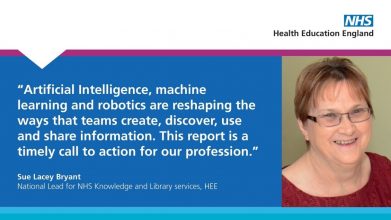Health Education England’s Response
This research report, funded by Heath Education England, explores the impact of the 4th Industrial Revolution and the associated technologies of AI, machine learning, process automation and robotics on the information professions. Health Education England welcomes the report as a major step forward in helping the profession advance further into the digital future.
The research shows that AI, machine learning, process automation and robotics are as much ‘ideas’ as specific technologies. These ideas are already changing the ways in which users interact with information.
There is a huge opportunity for the information professions to position themselves at the heart of this process, not as technologists but rather as trusted information professionals holding a range of roles:
• In leadership positions, taking the driving seat as organisations apply AI, machine learning, automation and robotics to deliver on business objectives
• Offering authoritative support to employers in all sectors to harness these technologies while minimising the risks
• As a source of trusted and authoritative leadership for our users

The research highlights three key sets of related findings for the future skills needs of the information professions:
- The existing ethical basis of the information professions is well-suited to addressing the ethical implications of AI, machine learning, process automation and robotics
- There is a strong alignment between the existing skill-set of information professionals and the demands of new technologies
- There are some areas in which the information professions need to be supported to develop new skills
In addition to recommendations for CILIP, the report offers recommendations to Information Services and Libraries and to individual information professionals:
For information services and libraries
- Leaders need to create organisational structures and cultures which empower staff to experiment with AI, machine learning, automation and robotics
- Information services and libraries should actively engage with AI to explore the potential benefit to users
- Where possible, information services should actively share their knowledge across the wider profession
For individual information professionals
- In the spirit of the professional obligation to keep their skills up-to-date, individuals need to be inquisitive and willing to explore the opportunities and capabilities of new technologies.
- In the spirit of the professional obligation to engage with colleagues, individuals need to share their understanding and promote their vision of the relevance of AI, machine learning, automation and robotics to the profession.
In response to the issues raised by the research report Health Education England has:
- Worked closely with CILIP to refresh and relaunch the Professional Knowledge and Skills Base (PKSB) and associated healthcare guidance, ensuring the range of skills identified in the research report are included. NHS knowledge and library specialists in England can access to tool either via their CILIP membership or via Health Education England’s knowledge and library team.
- Health Education England has commissioned a number of current awareness services to cover the range of digital and data developments. HEE’s Knowledge Management team offer a weekly Technology Update bulletin covering the three areas of the Topol review (Genomics, Artificial Intelligence and Digital Medicine). A monthly round-up covers emerging technologies in knowledge and library services.
- Library Carpentry training has been commissioned for NHS knowledge and library specialists with over 80 spaces offered during 2021. Library Carpentry focuses on building software and data skills within library and information-related communities.
- In response to the Topol Review, Heath Education England’s National School of Healthcare Science is working with Manchester University to develop modules for NHS staff to develop skills and knowledge around digital and data science. Our team has commissioned a skilled and experienced NHS knowledge and library manager to work with the developers and develop focus groups to map the modules to the PKSB.
Useful Links:
Press Release: Health Education England supports study into impact of emerging technology on the information profession
Blog: Two years on from Topol: Preparing ourselves for the Digital future